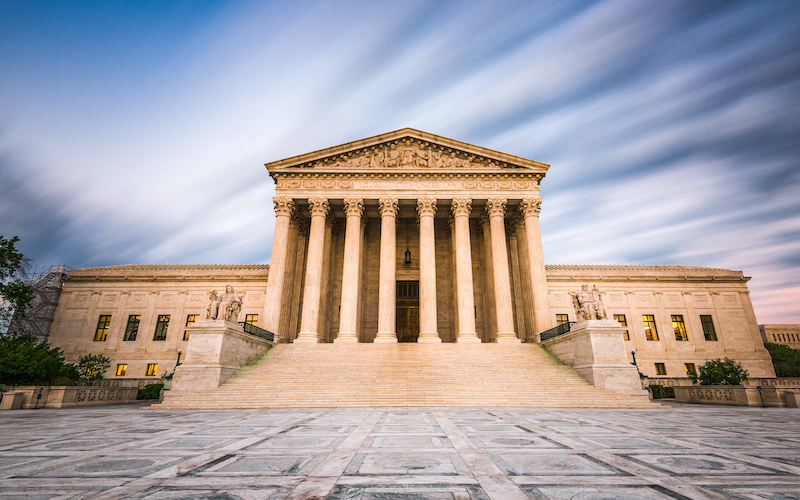
A death penalty case could unsettle the borders of Native American reservations nationwide.
A case before the U.S. Supreme Court helped determine how much of Tulsa, Oklahoma will become part of the Muscogee (Creek) Nation reservation. And a man’s life hung in the balance.
The case hinged on a legal rule that protects the historical borders of a tribal reservation unless Congress explicitly diminishes them. Although the Supreme Court has applied this rule for decades, it had never ruled on a dispute as geographically large as this one—one with the potential to establish the Muscogee Nation’s authority over eight Oklahoma counties, including most of greater Tulsa.
The case originated in Oklahoma state court, after a judge sentenced Patrick Dwayne Murphy, a member of the Muscogee Nation, to death for murder. Murphy appealed the ruling, alleging that the crime occurred on land controlled by the Muscogee Nation. If the land where the crime occurred is deemed to be tribal land, this would remove Murphy’s case from Oklahoma state court to the federal court system.
The main issue is not actually where the crime occurred, but whether that land was still part of the Muscogee Nation even though the tribe has not exercised control over it for decades. Murphy argued that the federal government never formally shrank the reservation from its historical borders. He claimed that legal precedent dictates that reservation lands cannot be diminished except when Congress clearly approves a reduction in their size.
Determining that the land belonged to the Muscogee Nation means that federal—not state–laws apply to Murphy’s case. This is because, although tribes have their own tribal governments and rules, Congress can also write laws that apply on tribal land.
In this vein, Congress passed the Major Crimes Act (MCA) in 1948. The law removed tribal jurisdiction over an enumerated list of crimes committed by people legally considered “Indian” within “Indian country” and assigned that jurisdiction exclusively to the federal courts. To try to throw out his Oklahoma murder conviction and death sentence, Murphy claimed that the alleged murder occurred in what the MCA treats as “Indian country” and is therefore subject to the MCA. This would move Murphy’s criminal proceedings to the federal court system.
Courts are supposed to use a three-factor test derived to determine whether Congress diminished the borders of a reservation. First, a court should examine the text of the law that established the reservation to determine Congress’s intent at the time. The Supreme Court reaffirmed in 2016 that this factor is the “most probative” when determining reservation borders.
Second, a court should explore the historical context surrounding the law and reservation. This context cannot contain conflicting narratives if a court is to give this factor significant weight.
Finally, a court is supposed to consider the subsequent history and demographics surrounding the dispute, although a court has never in fact actually relied on this factor when reviewing cases about tribal borders. In fact, the Supreme Court recently affirmed tribal jurisdiction over land where the Omaha Tribe had not been present for hundreds of years.
Murphy’s case—known as Sharp v. Murphy—arrived at the Supreme Court after the U.S. Court of Appeals for the Tenth Circuit ruled that Congress had not diminished the borders of the Muscogee Nation reservation. The Tenth Circuit held in favor of the reservation’s larger historical borders—which included most of Tulsa.
After hearing oral arguments in 2018, the Supreme Court ordered Murphy and the state of Oklahoma to submit additional briefings on the question of whether certain technicalities should affect the application of the traditional three-part test in this case. The Court specifically requested Murphy and Oklahoma to explore whether any laws grant Oklahoma jurisdiction over crimes “committed by Indians in the area within the 1866 territorial boundaries of the Creek Nation, irrespective of the area’s reservation status,” and whether circumstances exist where “land qualifies as an Indian reservation” but does not meet the definition of “Indian country.”
By inquiring about potential loopholes that would change the applicable legal test’s outcome, the Supreme Court appeared to search for a legal justification to rule in favor of the Muscogee Nation reservation’s smaller borders.
Because Justice Neil Gorsuch recused himself from Sharp v. Murphy, only eight justices could determine the Supreme Court’s ruling—potentially resulting in a tie. This would leave intact the lower court’s decision to recognize expansive boundaries for the Muscogee Nation reservation, and create no binding precedent.
The Supreme Court resolved the case in July 2020 by deciding another: McGirt v. Oklahoma. Although Jimcy McGirt filed claims in the face of a 500-year sentence for sexual offenses rather than a death sentence for murder, McGirt presented arguments to the Court in May 2020 similar to Murphy’s, contending that the location of his crimes held reservation status. Additionally, Justice Gorsuch was not recused from ruling on McGirt.
In fact, Justice Gorsuch wrote the Court’s majority opinion, and ruled in favor of Jimcy McGirt and effectively the Muscogee Nation. Gorsuch reiterated the importance of analyzing Congress’ intent on whether a reservation is diminished over Oklahoma’s historical and demographic considerations, concluding that “the magnitude of a legal wrong is no reason to perpetuate it.”
The Supreme Court subsequently issued an opinion reaffirming Murphy’s Tenth Circuit victory “for the reasons stated in McGirt v. Oklahoma.”
Professor Maggie Blackhawk of University of Pennsylvania Law School has argued that decisions in the area of federal Indian law are all about “power—the ability to make and apply the laws that govern daily life.” The Supreme Court’s rulings in McGirt v. Oklahoma and Sharp v. Murphy determined not only which government has authority over the laws surrounding Murphy’s murder charge, but also which government will hold power over Oklahomans for years to come.



